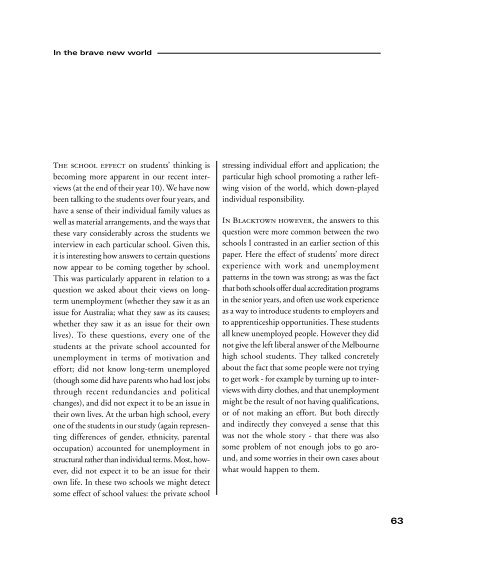Ladda ner utgåvan. - Fakultet för lärarutbildning - Umeå universitet
Ladda ner utgåvan. - Fakultet för lärarutbildning - Umeå universitet
Ladda ner utgåvan. - Fakultet för lärarutbildning - Umeå universitet
You also want an ePaper? Increase the reach of your titles
YUMPU automatically turns print PDFs into web optimized ePapers that Google loves.
In the brave new world<br />
The school effect on students’ thinking is<br />
becoming more apparent in our recent interviews<br />
(at the end of their year 10). We have now<br />
been talking to the students over four years, and<br />
have a sense of their individual family values as<br />
well as material arrangements, and the ways that<br />
these vary considerably across the students we<br />
interview in each particular school. Given this,<br />
it is interesting how answers to certain questions<br />
now appear to be coming together by school.<br />
This was particularly apparent in relation to a<br />
question we asked about their views on longterm<br />
unemployment (whether they saw it as an<br />
issue for Australia; what they saw as its causes;<br />
whether they saw it as an issue for their own<br />
lives). To these questions, every one of the<br />
students at the private school accounted for<br />
unemployment in terms of motivation and<br />
effort; did not know long-term unemployed<br />
(though some did have parents who had lost jobs<br />
through recent redundancies and political<br />
changes), and did not expect it to be an issue in<br />
their own lives. At the urban high school, every<br />
one of the students in our study (again representing<br />
differences of gender, ethnicity, parental<br />
occupation) accounted for unemployment in<br />
structural rather than individual terms. Most, however,<br />
did not expect it to be an issue for their<br />
own life. In these two schools we might detect<br />
some effect of school values: the private school<br />
stressing individual effort and application; the<br />
particular high school promoting a rather leftwing<br />
vision of the world, which down-played<br />
individual responsibility.<br />
In Blacktown however, the answers to this<br />
question were more common between the two<br />
schools I contrasted in an earlier section of this<br />
paper. Here the effect of students’ more direct<br />
experience with work and unemployment<br />
patterns in the town was strong; as was the fact<br />
that both schools offer dual accreditation programs<br />
in the senior years, and often use work experience<br />
as a way to introduce students to employers and<br />
to apprenticeship opportunities. These students<br />
all knew unemployed people. However they did<br />
not give the left liberal answer of the Melbourne<br />
high school students. They talked concretely<br />
about the fact that some people were not trying<br />
to get work - for example by turning up to interviews<br />
with dirty clothes, and that unemployment<br />
might be the result of not having qualifications,<br />
or of not making an effort. But both directly<br />
and indirectly they conveyed a sense that this<br />
was not the whole story - that there was also<br />
some problem of not enough jobs to go around,<br />
and some worries in their own cases about<br />
what would happen to them.<br />
63

















